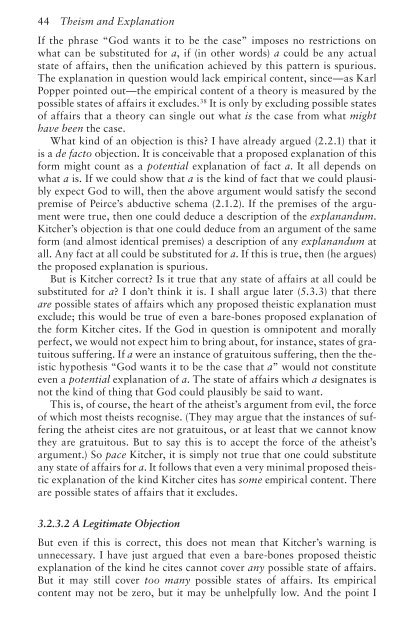Theism and Explanation - Appeared-to-Blogly
Theism and Explanation - Appeared-to-Blogly
Theism and Explanation - Appeared-to-Blogly
You also want an ePaper? Increase the reach of your titles
YUMPU automatically turns print PDFs into web optimized ePapers that Google loves.
44 <strong>Theism</strong> <strong>and</strong> <strong>Explanation</strong><br />
If the phrase “God wants it <strong>to</strong> be the case” imposes no restrictions on<br />
what can be substituted for a, if (in other words) a could be any actual<br />
state of affairs, then the unifi cation achieved by this pattern is spurious.<br />
The explanation in question would lack empirical content, since—as Karl<br />
Popper pointed out—the empirical content of a theory is measured by the<br />
possible states of affairs it excludes. 38 It is only by excluding possible states<br />
of affairs that a theory can single out what is the case from what might<br />
have been the case.<br />
What kind of an objection is this? I have already argued (2.2.1) that it<br />
is a de fac<strong>to</strong> objection. It is conceivable that a proposed explanation of this<br />
form might count as a potential explanation of fact a. It all depends on<br />
what a is. If we could show that a is the kind of fact that we could plausibly<br />
expect God <strong>to</strong> will, then the above argument would satisfy the second<br />
premise of Peirce’s abductive schema (2.1.2). If the premises of the argument<br />
were true, then one could deduce a description of the explan<strong>and</strong>um.<br />
Kitcher’s objection is that one could deduce from an argument of the same<br />
form (<strong>and</strong> almost identical premises) a description of any explan<strong>and</strong>um at<br />
all. Any fact at all could be substituted for a. If this is true, then (he argues)<br />
the proposed explanation is spurious.<br />
But is Kitcher correct? Is it true that any state of affairs at all could be<br />
substituted for a? I don’t think it is. I shall argue later (5.3.3) that there<br />
are possible states of affairs which any proposed theistic explanation must<br />
exclude; this would be true of even a bare-bones proposed explanation of<br />
the form Kitcher cites. If the God in question is omnipotent <strong>and</strong> morally<br />
perfect, we would not expect him <strong>to</strong> bring about, for instance, states of gratui<strong>to</strong>us<br />
suffering. If a were an instance of gratui<strong>to</strong>us suffering, then the theistic<br />
hypothesis “God wants it <strong>to</strong> be the case that a” would not constitute<br />
even a potential explanation of a. The state of affairs which a designates is<br />
not the kind of thing that God could plausibly be said <strong>to</strong> want.<br />
This is, of course, the heart of the atheist’s argument from evil, the force<br />
of which most theists recognise. (They may argue that the instances of suffering<br />
the atheist cites are not gratui<strong>to</strong>us, or at least that we cannot know<br />
they are gratui<strong>to</strong>us. But <strong>to</strong> say this is <strong>to</strong> accept the force of the atheist’s<br />
argument.) So pace Kitcher, it is simply not true that one could substitute<br />
any state of affairs for a. It follows that even a very minimal proposed theistic<br />
explanation of the kind Kitcher cites has some empirical content. There<br />
are possible states of affairs that it excludes.<br />
3.2.3.2 A Legitimate Objection<br />
But even if this is correct, this does not mean that Kitcher’s warning is<br />
unnecessary. I have just argued that even a bare-bones proposed theistic<br />
explanation of the kind he cites cannot cover any possible state of affairs.<br />
But it may still cover <strong>to</strong>o many possible states of affairs. Its empirical<br />
content may not be zero, but it may be unhelpfully low. And the point I



